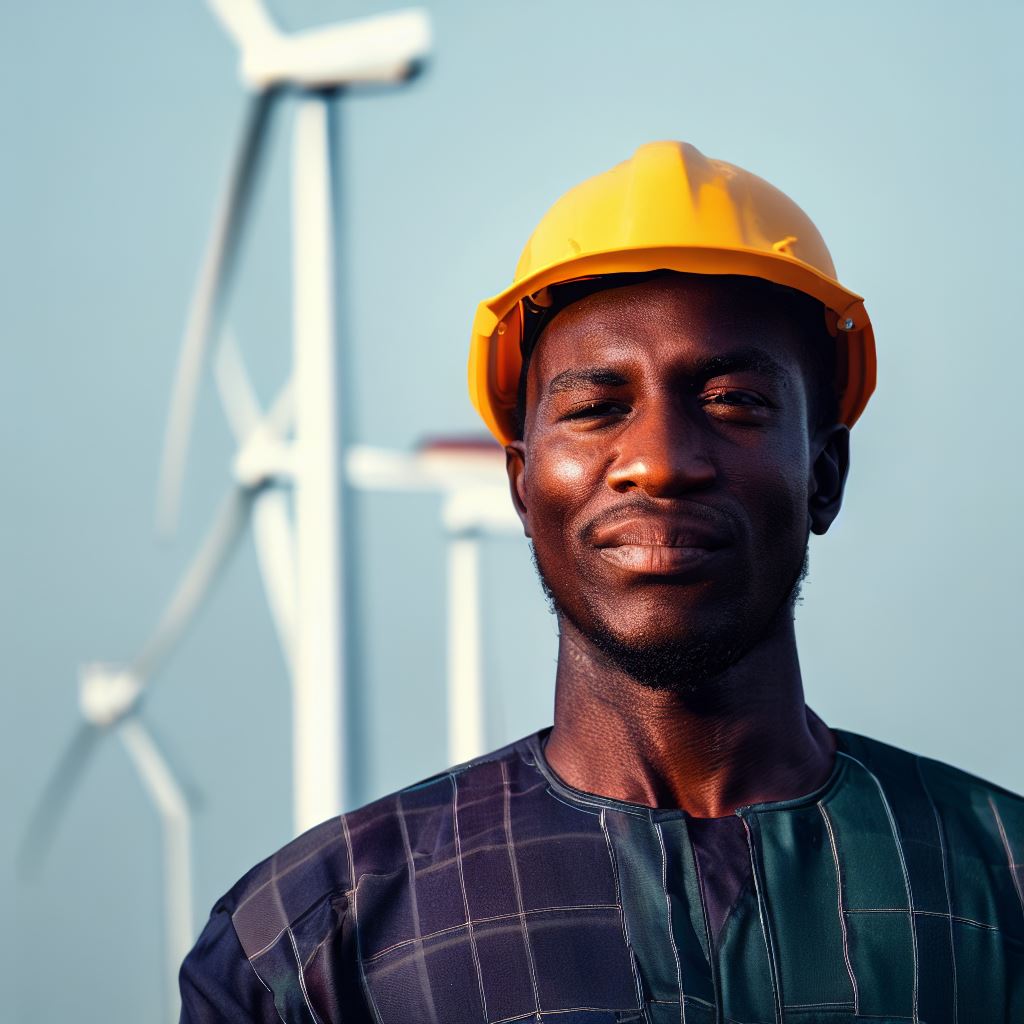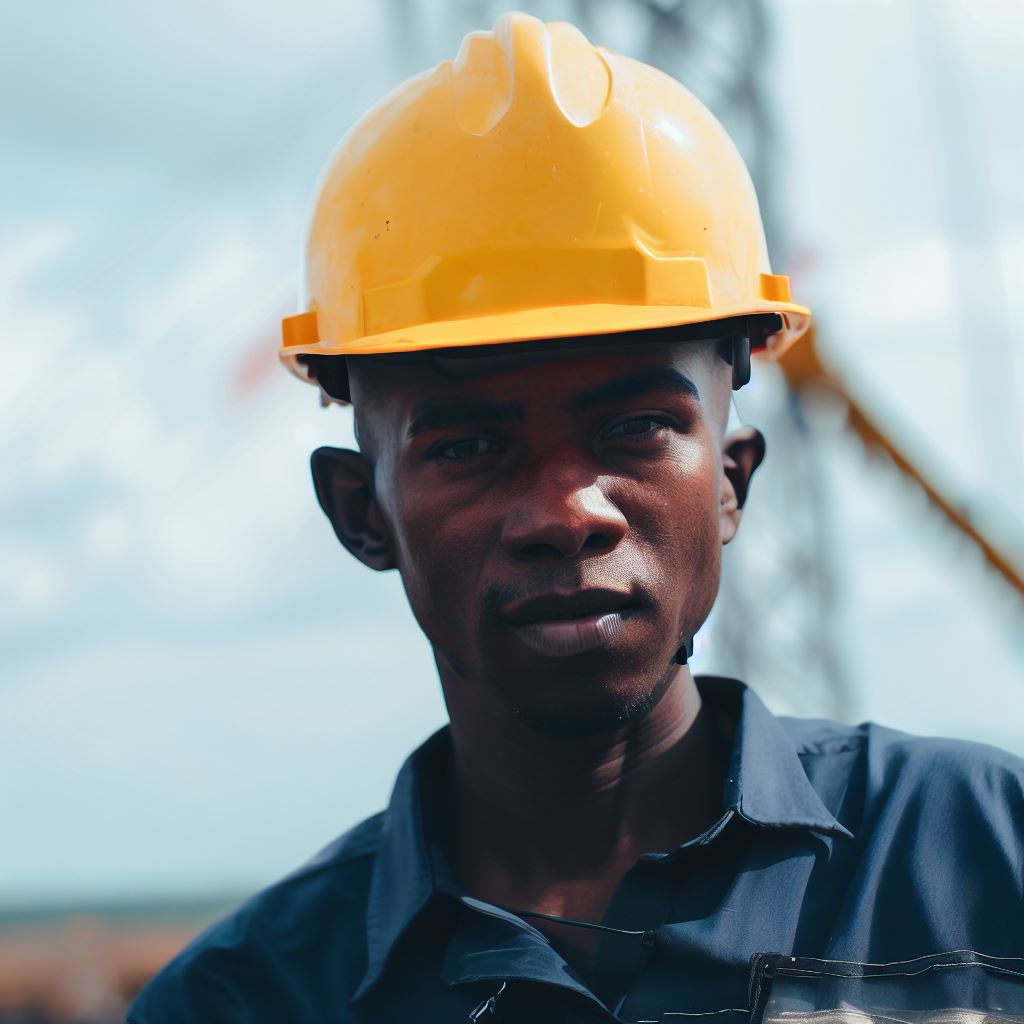Introduction
Let’s talk about safety protocols for wind turbine technicians.
Importance of Wind Turbine Technicians’ Safety in Nigeria
Wind turbine technicians play a crucial role in Nigeria’s renewable energy sector, ensuring the smooth operation and maintenance of wind turbines.
However, their safety is of utmost importance to prevent accidents and protect their well-being.
Brief overview of the blog post’s purpose and structure
This blog post aims to discuss the safety protocols required for wind turbine technicians in Nigeria.
It will provide an insight into the importance of safety measures in this profession and shed light on the structure and content of the upcoming sections.
The blog post will focus on the unique challenges faced by wind-turbine technicians in Nigeria and how safety measures can mitigate these risks.
It will also explore the specific protocols and guidelines that should be implemented to ensure a safe working environment for the technicians.
Furthermore, the post will address the training and certification requirements necessary for wind turbine technicians, emphasizing the need for continuous education to stay updated with the latest safety standards.
Lastly, it will conclude by summarizing the key points discussed in the post and emphasizing the significance of prioritizing safety for wind turbine technicians in Nigeria.
Overall, this blog post aims to raise awareness about the importance of safety protocols for wind turbine technicians in Nigeria and highlight the steps that need to be taken to ensure their well-being.
Overview of Wind Turbine Technicians in Nigeria
Explanation of the role and responsibilities
- Wind turbine technicians play a crucial role in ensuring the efficient and safe operation of wind turbines.
- They are responsible for the installation, maintenance, and repair of wind turbines and associated equipment.
- Their duties include inspecting turbine components, identifying and resolving technical issues, and performing routine maintenance tasks.
- They also conduct tests and measurements to assess the turbine’s performance and ensure compliance with safety standards.
- Additionally, wind turbine technicians may need to collaborate with engineers and other professionals to optimize turbine performance.
The growth of wind energy sector in Nigeria
- Nigeria has witnessed a remarkable growth in its wind energy sector in recent years.
- The government has implemented policies and incentives to attract investments in renewable energy, including wind power.
- International organizations and private firms have shown interest in developing wind farms across the country.
- These wind farms not only contribute to the generation of clean and sustainable energy but also create employment opportunities.
- The growth of the wind energy sector in Nigeria is aligned with the global shift towards renewable energy sources.
Increase in demand for wind turbine technicians
- The increase in wind energy projects has led to a surge in the demand for skilled wind turbine technicians in Nigeria.
- With more wind farms being developed, there is a need for qualified technicians who can ensure the safe and efficient operation of the turbines.
- As wind turbines are located in remote and challenging environments, technicians must possess physical fitness and the ability to work at heights.
- Wind turbine technicians with specialized training and relevant certifications are highly sought after by employers.
- Moreover, the demand for wind turbine technicians is expected to continue rising as the country further expands its wind energy capacity.
Read: Regulations Impacting Janitorial Work in Nigeria
Hazards Faced by Wind Turbine Technicians
Working at heights and associated risks
- Working at heights is one of the primary hazards faced by wind turbine technicians in Nigeria.
- Technicians are often required to climb up the turbines, which can be several hundred feet tall.
- The risk of falling from such heights is significant and can result in severe injuries or even fatalities.
- To mitigate this risk, technicians must follow stringent safety protocols and use appropriate fall protection equipment.
Electrical hazards and precautions
- Wind turbines generate electricity, which exposes technicians to the risk of electrical hazards.
- Technicians must ensure that the turbines are properly de-energized before working on them.
- They should also wear appropriate personal protective equipment, such as insulated gloves and footwear, to prevent electric shocks.
- Proper training on electrical safety protocols is crucial for technicians to minimize the risk of accidents.
Dangerous weather conditions and safety measures
- Wind turbine technicians in Nigeria often have to work in challenging weather conditions.
- Strong winds, heavy rains, and lightning storms pose significant dangers to their safety.
- To address this, technicians should closely monitor weather forecasts and only work when conditions are safe.
- They should also understand the procedures for safe evacuation in case of severe weather events.
Potential hazards from equipment and machinery
- Working with wind turbine equipment and machinery introduces potential hazards to technicians.
- These hazards include getting caught in moving parts, entanglement in cables, and injuries from tools and equipment.
- Technicians should receive proper training on equipment operation and maintenance procedures to minimize these risks.
- Regular inspections and maintenance of equipment are also essential to prevent accidents.
Overall, wind turbine technicians in Nigeria face several hazards in their line of work.
Working at heights requires strict adherence to safety protocols and the use of fall protection equipment.
Electrical hazards necessitate proper training and the use of personal protective equipment.
Dangerous weather conditions demand close monitoring and evacuation procedures.
Finally, potential hazards from equipment and machinery highlight the need for training and regular inspections.
By recognizing and addressing these hazards, the safety of wind turbine technicians can be greatly improved.
Read: Health & Safety Standards for Janitors in Nigeria
Safety Protocols for Wind Turbine Technicians
Proper use of personal protective equipment (PPE)
- Wind turbine technicians in Nigeria must always wear appropriate PPE while on the job.
- This includes protective helmets, safety harnesses, gloves, goggles, and steel-toe boots.
- PPE is crucial to protect technicians from head injuries, falls, electrocution, and other hazards.
- Regular inspection and maintenance of PPE should be conducted to ensure its effectiveness.
Training and certifications requirement
- Wind turbine technicians in Nigeria must undergo thorough training and obtain relevant certifications.
- This training equips them with the necessary knowledge and skills to perform their job safely.
- Certifications demonstrate the technician’s competence in handling wind turbines and adhering to safety protocols.
- Regular refresher courses should be attended to stay updated with the latest safety practices and technologies.
Guidelines for working at heights and fall protection
- Wind turbine technicians often work at considerable heights, making fall protection crucial.
- Adhering to guidelines for working at heights, such as using safety harnesses and guardrails, is essential.
- Regular inspection and maintenance of fall protection systems should be conducted to ensure their reliability.
- Proper communication and collaboration among technicians are important to prevent accidents and falls.
Adherence to lockout/tagout procedures
- Proper lockout/tagout procedures must be followed when servicing or repairing wind turbines.
- This involves isolating and de-energizing the turbine, and using lockout devices to prevent accidental startup.
- Only authorized technicians should be allowed to perform lockout/tagout procedures.
- Non-compliance with these procedures can lead to serious injuries or fatalities.
Safe handling and maintenance of equipment and tools
- Wind turbine technicians should receive training on the safe handling and maintenance of equipment and tools.
- Proper usage and storage of tools are crucial to prevent accidents and preserve their functionality.
- Regular inspection and maintenance of equipment are necessary to identify and address any potential safety hazards.
- Any damaged or faulty equipment should be immediately reported and replaced.
Emergency response and evacuation plans
- Wind turbine technicians must be familiar with emergency response and evacuation plans.
- These plans should include procedures for fire, electric shock, severe weather, and medical emergencies.
- Regular drills and training sessions should be conducted to ensure technicians are prepared for emergencies.
- Effective communication channels and emergency contact information should be readily available to all technicians.
Basically, wind turbine technicians in Nigeria must prioritize safety protocols to prevent accidents and ensure their well-being.
Proper use of personal protective equipment, training, guidelines for working at heights, adherence to lockout/tagout procedures, safe handling and maintenance of equipment, and knowledge of emergency response plans are all crucial elements of a comprehensive safety program.
By implementing these protocols, technicians can carry out their work safely and minimize the risks associated with wind turbine maintenance and operation.
Read: Janitors in Nigeria: A Focus on Environmental Care
Importance of Job-Specific Safety Training
Specialized training requirements for wind turbine technicians
- Wind turbine technicians need specialized training to safely operate in their unique work environment.
- This training encompasses various aspects of safety, including working at height, electrical safety, and emergency response.
- Job-specific safety training is crucial for technicians to prevent accidents, injuries, and fatalities while performing their duties.
- Nigeria, with its growing wind energy sector, requires technicians to be equipped with the necessary skills and knowledge to work safely.
- Employers should ensure that their technicians receive comprehensive job-specific safety training to mitigate risks.
Benefits of job-specific safety training programs
- Job-specific safety training programs provide numerous benefits to both technicians and employers.
- Technicians who undergo such training gain a deeper understanding of potential hazards in their work environment.
- By recognizing risks, technicians can take proactive measures to prevent accidents before they occur.
- Training programs enhance technicians’ awareness of safety protocols, improving their overall work efficiency and effectiveness.
- Implementing safety training programs also helps organizations meet legal and regulatory requirements.
- Employers can demonstrate their commitment to safety by investing in comprehensive training programs for their technicians.
- Reducing workplace accidents not only protects technicians but also minimizes downtime and financial losses for employers.
Enhancing technical skills while ensuring safety
- Job-specific safety training programs not only focus on safety but also enhance technicians’ technical skills.
- These programs equip technicians with the knowledge and expertise required to operate and maintain wind turbines effectively.
- By improving technical skills, technicians can perform their tasks more efficiently, ensuring optimal turbine performance.
- Proper training also enables technicians to identify potential technical issues and address them promptly, preventing costly repairs.
- Moreover, enhanced technical skills promote career advancement opportunities for technicians.
- With the rapidly growing wind energy sector, skilled technicians have greater prospects for professional growth and development.
- Therefore, job-specific safety training programs offer a dual benefit of ensuring safety and enhancing technical proficiency.
In fact, job-specific safety training plays a vital role in the wind energy industry in Nigeria.
Wind turbine technicians require specialized training to work safely and efficiently in their unique environment.
These training programs offer several benefits, including accident prevention, improved work efficiency, and regulatory compliance.
Moreover, they enhance technicians’ technical skills, enabling them to effectively operate and maintain wind turbines.
By investing in comprehensive safety training, employers demonstrate their commitment to the well-being of their technicians and the overall success of their operations.
Read: School Janitors in Nigeria: Role and Responsibilities

The Role of Employers in Ensuring Safety
A safe working environment is crucial for wind-turbine technicians in Nigeria.
Employers play a significant role in ensuring the safety of their technicians. They can achieve this by:
Developing comprehensive safety policies and procedures
- Creating a set of clear and detailed safety guidelines that address potential hazards.
- Establishing procedures for safe work practices, emergency response, and incident reporting.
- Regularly reviewing and updating safety policies to keep up with industry standards and best practices.
Providing adequate safety equipment and resources
- Supplying wind-turbine technicians with the necessary personal protective equipment (PPE).
- Ensuring that PPE is in good condition and regularly inspected for defects or wear.
- Offering sufficient resources, such as safety manuals, training materials, and access to safety training programs.
Conducting regular safety inspections and audits
- Performing routine inspections of wind turbines, equipment, and work areas to identify potential hazards.
- Conducting audits to assess the effectiveness of safety protocols and compliance with regulations.
- Addressing any identified safety issues promptly and implementing corrective actions.
Promoting a safety-oriented work culture
- Instilling a safety-first mentality across the organization through training and awareness programs.
- Creating incentives and recognition systems for employees who prioritize safety.
- Enforcing disciplinary actions for safety violations to ensure compliance with safety protocols.
Encouraging open communication on safety concerns
- Establishing channels for wind-turbine technicians to report safety concerns or near-miss incidents.
- Encouraging employees to share their observations, ideas, and suggestions for improving safety.
- Acting on the feedback received and communicating the actions taken to address safety concerns.
Overall, employers in Nigeria’s wind-turbine industry have a responsibility to prioritize the safety of their technicians.
By developing comprehensive safety policies, providing adequate resources, conducting regular inspections, promoting a safety-oriented work culture, and encouraging open communication, employers can create a safe environment for their technicians to perform their duties.
You Might Also Like: Gender Dynamics in Waiting Jobs: Nigeria’s Scene
Challenges in Implementing Safety Protocols
- A lack of awareness and enforcement creates hurdles in implementing safety protocols in wind-turbine technician jobs.
- The limited availability of safety resources and training programs poses a significant challenge for technicians in Nigeria.
- Compliance issues arise when attempting to overcome resistance to change and implement safety protocols effectively.
- Addressing language and literacy barriers becomes crucial in ensuring the successful implementation of safety measures.
Lack of awareness and enforcement
One of the biggest challenges faced in implementing safety protocols for wind-turbine technicians in Nigeria is the lack of awareness and enforcement.
Many technicians are not properly informed about safety measures, their importance, and the potential risks they face on the job.
This lack of awareness can lead to a casual attitude towards safety, resulting in a higher likelihood of accidents and injuries.
Additionally, without proper enforcement of safety protocols by employers and authorities, technicians may not feel compelled to follow these measures.
In order to address this challenge, there needs to be a comprehensive awareness campaign highlighting the importance of safety protocols for wind-turbine technicians.
This can include informative sessions, training programs, and the dissemination of educational materials.
Limited availability of safety resources and training programs
Another major challenge is the limited availability of safety resources and training programs in Nigeria.
The country may not have sufficient facilities, experienced trainers, or educational materials to provide comprehensive safety training to all wind-turbine technicians.
This inadequacy deprives technicians of the necessary knowledge and skills to handle the potential hazards associated with their work.
It also hampers their ability to respond effectively to emergencies and follow proper safety procedures.
Addressing this challenge requires the establishment of partnerships between relevant stakeholders, such as government agencies, training institutes, and industry associations.
These partnerships can help develop and implement training programs, create safety resources, and improve access to essential safety equipment.
Compliance issues and overcoming resistance to change
Implementing safety protocols often faces obstacles due to compliance issues and resistance to change.
Some employers or technicians may resist implementing new safety protocols because of concerns about increased costs or disruption to their workflow.
Overcoming this resistance to change requires effective communication and engagement with all stakeholders.
It is crucial to demonstrate the potential benefits of safety protocols, such as reduced accident rates, improved worker productivity, and cost savings in the long run.
Regular monitoring and enforcement can also play a significant role in ensuring compliance.
Addressing language and literacy barriers
The diversity of languages spoken in Nigeria can pose challenges in implementing safety protocols.
Technicians who do not understand safety instructions due to language barriers are more likely to overlook or misunderstand critical safety procedures.
Addressing language and literacy barriers requires the translation of safety materials, providing multilingual training sessions, and appointing interpreters or language instructors when necessary.
It is essential to ensure that all technicians can comprehend safety instructions and communicate effectively with their colleagues.
In short, the successful implementation of safety protocols for wind-turbine technicians in Nigeria requires addressing challenges related to awareness, availability of resources, compliance, and language barriers.
By prioritizing these areas and taking proactive measures, the safety standards and overall well-being of technicians can be significantly improved.
Case Studies of Successful Safety Implementation
Highlighting wind energy companies with exemplary safety records
- Green Energy Solutions: With a strong commitment to safety, Green Energy Solutions has implemented comprehensive safety protocols for their wind-turbine technicians.
- WindPower Innovations: This company prioritizes safety and provides regular training sessions for their technicians on safety procedures and protocols.
- Sustainable Wind Technologies: By investing in state-of-the-art safety equipment and conducting regular safety audits, Sustainable Wind Technologies ensures the well-being of their technicians.
- EcoWind Systems: With an emphasis on safety culture, EcoWind Systems has established a strong safety management system that includes hazard identification and risk assessment.
- Renewable Dynamics: This company promotes a safety-first approach by encouraging open communication and providing a safe work environment for their technicians.
Sharing real-life incidents and lessons learned
- Incident: A wind-turbine technician in Nigeria fell from a height due to improper harness usage, resulting in severe injuries.
Lesson: Proper training on harness usage and regular equipment inspections are crucial to prevent such accidents. - Incident: A technician failed to secure a component properly, leading to its detachment during turbine operation and causing damage.
Lesson: Strict adherence to maintenance and installation procedures can prevent costly equipment failures. - Incident: A technician suffered an electrical shock while working on a wind turbine, highlighting the importance of electrical safety training and proper use of personal protective equipment.
- Incident: Lack of proper lockout/tagout procedures resulted in a turbine starting unexpectedly, endangering the technician.
Lesson: Understanding and following lockout/tagout procedures are essential for technician safety. - Incident: A technician was injured by a flying object during turbine maintenance, emphasizing the need for proper hazard assessment and the use of safety barriers.
In review, these case studies demonstrate the importance of implementing robust safety protocols for wind-turbine technicians in Nigeria.
Companies like Green Energy Solutions, WindPower Innovations, Sustainable Wind Technologies, EcoWind Systems, and Renewable Dynamics serve as exemplars in prioritizing technician safety.
Real-life incidents further emphasize the importance of proper training, equipment inspections, adherence to protocols, and hazard assessment to ensure the well-being of wind-turbine technicians.
By learning from these experiences, we can strive for a safer work environment in the wind energy sector.
Conclusion
Recap of the importance of safety protocols for wind turbine technicians in Nigeria
It is crucial to prioritize safety protocols for wind turbine technicians in Nigeria to prevent accidents and ensure their well-being.
Call to action for promoting a safer work environment
We must actively promote a safer work environment by implementing and enforcing strict safety protocols.
Final thoughts and encouragement to prioritize safety among all stakeholders
Every stakeholder, including employers, technicians, and regulatory bodies, should prioritize safety to minimize risks and maintain a safe workplace.




